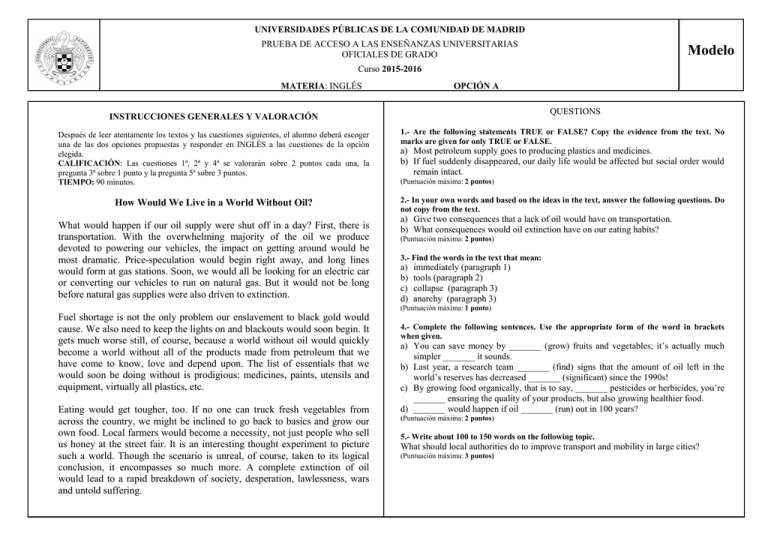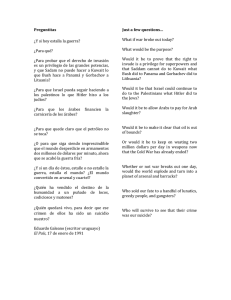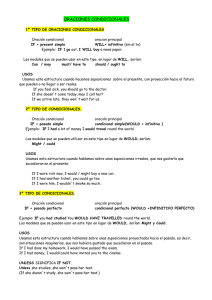Modelo - Universidad Complutense de Madrid
Anuncio

UNIVERSIDADES PÚBLICAS DE LA COMUNIDAD DE MADRID PRUEBA DE ACCESO A LAS ENSEÑANZAS UNIVERSITARIAS OFICIALES DE GRADO Modelo Curso 2015-2016 MATERIA: INGLÉS OPCIÓN A QUESTIONS INSTRUCCIONES GENERALES Y VALORACIÓN 1.- Are the following statements TRUE or FALSE? Copy the evidence from the text. No marks are given for only TRUE or FALSE. Después de leer atentamente los textos y las cuestiones siguientes, el alumno deberá escoger una de las dos opciones propuestas y responder en INGLÉS a las cuestiones de la opción elegida. CALIFICACIÓN: Las cuestiones 1ª, 2ª y 4ª se valorarán sobre 2 puntos cada una, la pregunta 3ª sobre 1 punto y la pregunta 5ª sobre 3 puntos. TIEMPO: 90 minutos. a) Most petroleum supply goes to producing plastics and medicines. b) If fuel suddenly disappeared, our daily life would be affected but social order would remain intact. How Would We Live in a World Without Oil? 2.- In your own words and based on the ideas in the text, answer the following questions. Do not copy from the text. What would happen if our oil supply were shut off in a day? First, there is transportation. With the overwhelming majority of the oil we produce devoted to powering our vehicles, the impact on getting around would be most dramatic. Price-speculation would begin right away, and long lines would form at gas stations. Soon, we would all be looking for an electric car or converting our vehicles to run on natural gas. But it would not be long before natural gas supplies were also driven to extinction. (Puntuación máxima: 2 puntos) a) Give two consequences that a lack of oil would have on transportation. b) What consequences would oil extinction have on our eating habits? (Puntuación máxima: 2 puntos) 3.- Find the words in the text that mean: a) b) c) d) immediately (paragraph 1) tools (paragraph 2) collapse (paragraph 3) anarchy (paragraph 3) (Puntuación máxima: 1 punto) Fuel shortage is not the only problem our enslavement to black gold would cause. We also need to keep the lights on and blackouts would soon begin. It gets much worse still, of course, because a world without oil would quickly become a world without all of the products made from petroleum that we have come to know, love and depend upon. The list of essentials that we would soon be doing without is prodigious: medicines, paints, utensils and equipment, virtually all plastics, etc. Eating would get tougher, too. If no one can truck fresh vegetables from across the country, we might be inclined to go back to basics and grow our own food. Local farmers would become a necessity, not just people who sell us honey at the street fair. It is an interesting thought experiment to picture such a world. Though the scenario is unreal, of course, taken to its logical conclusion, it encompasses so much more. A complete extinction of oil would lead to a rapid breakdown of society, desperation, lawlessness, wars and untold suffering. 4.- Complete the following sentences. Use the appropriate form of the word in brackets when given. a) You can save money by _______ (grow) fruits and vegetables; it’s actually much simpler _______ it sounds. b) Last year, a research team _______ (find) signs that the amount of oil left in the world’s reserves has decreased _______ (significant) since the 1990s! c) By growing food organically, that is to say, _______ pesticides or herbicides, you’re _______ ensuring the quality of your products, but also growing healthier food. d) _______ would happen if oil _______ (run) out in 100 years? (Puntuación máxima: 2 puntos) 5.- Write about 100 to 150 words on the following topic. What should local authorities do to improve transport and mobility in large cities? (Puntuación máxima: 3 puntos) UNIVERSIDADES PÚBLICAS DE LA COMUNIDAD DE MADRID PRUEBAS DE ACCESO A LAS ENSEÑANZAS UNIVERSITARIAS OFICIALES DE GRADO Curso 2015-2016 MATERIA: INGLÉS Modelo OPCIÓN B INSTRUCCIONES GENERALES Y VALORACIÓN Después de leer atentamente los textos y las cuestiones siguientes, el alumno deberá escoger una de las dos opciones propuestas y responder en INGLÉS a las cuestiones de la opción elegida. CALIFICACIÓN: Las cuestiones 1ª, 2ª y 4ª se valorarán sobre 2 puntos cada una, la pregunta 3ª sobre 1 punto y la pregunta 5ª sobre 3 puntos. TIEMPO: 90 minutos. Better Ways to Learn New studies challenge the notion that a high test score equals true learning. Although a good grade may be achieved in the short term by cramming for an exam, chances are that most of the information will be quickly lost. Indeed, these surveys show that over 70 % of students probably don’t need to study more – just more effectively. Based on decades of brain science, experts offer students a new method for learning. “Students tend to sit there and push themselves for hours, when there are other ways to make the learning more efficient, fun and interesting, which will maximize their learning potential,” researchers say. For instance, rather than sitting at the same desk studying for hours, changing the scenery will create new associations in your brain and make it easier to recall information later. Another way to signal to your brain that information is important is to talk about it. Self-testing and writing down information on flashcards also reinforces learning. Another technique is called “distributed learning” or “spacing”. Long study sessions may seem productive, but chances are that learners are spending most of their brainpower on maintaining their concentration for a long time. That does not leave a lot of brain energy for learning. “The brain wants variation. It wants to move, it wants to take periodic breaks.” Scientists also confirm that repeating the information over a longer interval – say a few days or a week later, rather than in rapid succession – sends a stronger signal to the brain to retain the information, and this enhances learning. QUESTIONS 1.- Are the following statements TRUE or FALSE? Copy the evidence from the text. No marks are given for only TRUE or FALSE. a) According to new studies, most learners should study harder. b) It is more difficult to retain information when studying in different places. (Puntuación máxima: 2 puntos) 2.- In your own words and based on the ideas in the text, answer the following questions. Do not copy from the text. a) Do good academic results mean that the student has truly learned? Explain. b) Why do short periods of study make our brain work better? (Puntuación máxima: 2 puntos) 3.- Find the words in the text that mean: a) b) c) d) idea (paragraph 1) capacity (paragraph 2) links (paragraph 2) improves (paragraph 3) (Puntuación máxima: 1 punto) 4.- Complete the following sentences. Use the appropriate form of the word in brackets when given. a) I am used to _______ (study) for a couple of hours every day _______ I was a child. b) _______ you take a break, studying the whole afternoon can be very _______ (stress). c) Don’t spend too _______ time _______ (try) to memorize the dates! d) Complete the following sentence to report what was said. The teacher asked the students: “Did you write a summary of the lesson for your last exam?” e) The teacher wanted to know ___________________________________________. (Puntuación máxima: 2 puntos) 5.- Write about 100 to 150 words on the following topic. Describe your study habits and routines and explain why they are good for you. (Puntuación máxima: 3 puntos) 2. SOLUCIONES OPCIÓN A: SUGGESTED ANSWERS Question 1 a) FALSE: “With the overwhelming majority of the oil we produce devoted to powering our vehicles, [the impact on getting around would be most dramatic].” b) FALSE: “A complete extinction of oil would lead to a rapid breakdown of society, desperation, lawlessness, wars and untold suffering.” Question 2 Key ideas a) There would be problems with transport and we wouldn’t be able to move around easily. / Petrol prices would increase and there would not be enough petrol for our cars. / We would need new cars moved by alternative fuels or we would need to transform our cars. b) People could cultivate fruits and vegetables and raise edible animals for their consumption. The consumption of products from the neighbourhood would increase. Question 3 a) right away b) utensils c) breakdown d) lawlessness Question 4 a) growing ----- than b) found ----- significantly c) without ----- not only d) What ----- ran 2 OPCIÓN B: SUGGESTED ANSWERS Question 1 a) FALSE: “Indeed, these surveys show that over 70 % of students probably don’t need to study more – just more effectively.” b) FALSE: “For instance, rather than sitting at the same desk studying for hours, changing the scenery will create new associations in your brain and make it easier to recall information later.” Question 2 Key ideas a) No, not really. Because students might have memorized a lot of things just for the test, but then they might quickly forget all this information. b) Studying for long sessions exhausts the brain. The brain needs having a rest every now and then. Question 3 a) notion b) potential c) associations d) enhances Question 4 a) studying ---- since b) Unless / Even if / Even though ---- stressful / stressing c) much ---- trying d) The teacher wanted to know if his / her students had written a summary of the lesson for their last exam. 3 INGLÉS CRITERIOS ESPECÍFICOS DE CORRECCIÓN Y ORIENTACIONES 1. CRITERIOS ESPECÍFICOS DE CORRECCIÓN El ejercicio incluirá cinco preguntas, pudiendo obtenerse por la suma de todas ellas una puntuación máxima de 10 puntos. Junto a cada pregunta se especifica la puntuación máxima otorgada. La valoración y los objetivos de cada una de estas preguntas son los siguientes: Pregunta 1: Hasta 2 puntos. Se trata de medir exclusivamente la comprensión lectora. El estudiante deberá decidir si dos frases que se le presentan son verdaderas o falsas, copiando a continuación únicamente el fragmento del texto que justifica su elección. Se otorgará 1 punto por cada apartado. Se calificará con 0 puntos la opción elegida que no vaya justificada. Pregunta 2: Hasta 2 puntos. Se pretende comprobar dos destrezas: la comprensión lectora y la expresión escrita, mediante la formulación de dos preguntas abiertas que el estudiante deberá contestar basándose en la información del texto, pero utilizando sus propias palabras en la respuesta. Cada una de las preguntas valdrá 1 punto, asignándose 0,5 puntos a la comprensión de la pregunta y del texto, y 0,5 a la corrección gramatical y ortográfica de la respuesta. Pregunta 3: Hasta 1 punto. Esta pregunta trata de medir el dominio del vocabulario en el aspecto de la comprensión. El estudiante demostrará esta capacidad localizando en el párrafo que se le indica un sinónimo, adecuado al contexto, de cuatro palabras o definiciones. Se adjudicará 0,25 por cada apartado. Pregunta 4: Hasta 2 puntos. Con esta pregunta se pretende comprobar los conocimientos gramaticales del estudiante, en sus aspectos morfológicos y/o sintácticos. Se presentarán oraciones con huecos que el estudiante deberá completar o rellenar. También podrán presentarse oraciones para ser transformadas u otro tipo de ítem. Se adjudicará 0,25 a cada “hueco en blanco” y en el caso de las transformaciones o ítems de otro tipo se concederá 0,5 con carácter unitario. Pregunta 5: Hasta 3 puntos. Se trata de una redacción, de 100 a 150 palabras, en la que el estudiante podrá demostrar su capacidad para expresarse libremente en inglés. Se propondrá una única opción y se otorgarán 1,5 puntos por el buen dominio de la lengua – léxico, estructura sintáctica, etc. – y 1,5 por la madurez en la expresión de las ideas – organización, coherencia y creatividad. 3. ORIENTACIONES PARA EL EJERCICIO DE LA ASIGNATURA DE INGLÉS EN LAS PRUEBAS DE ACCESO A LA UNIVERSIDAD Introducción Para la elaboración del ejercicio de Inglés se han tenido en cuenta los objetivos, los contenidos y los criterios de evaluación de la materia presentes en los decretos que establecen el currículo del Bachillerato en la Comunidad de Madrid y en la de CastillaLa Mancha: Decreto 67/2008, de la Comunidad de Madrid (BOCM 27 de Junio de 2008) y Decreto 85/2008 de la Comunidad Autónoma de Castilla-La Mancha (DOCM 20 de junio de 2008). Asimismo, este ejercicio de Inglés se sustenta en lo establecido por el Real Decreto 1892/2008, de 14 de noviembre, por el que se regulan las condiciones para el acceso a las enseñanzas universitarias oficiales de grado y los procedimientos de admisión a las universidades públicas españolas (BOE de 24 de noviembre 2008), modificado por el artículo único del Real Decreto 961/2012, de 22 de junio (BOE 3 de julio de 2012) y el artículo 3 del RD 534/2013, de 12 de julio (BOE 13 de julio de 2013). Tal y como explica el Decreto 67/2008, de la Comunidad de Madrid, en la etapa de Bachillerato, […] se continúa el proceso de aprendizaje de la lengua extranjera con el objetivo de que al finalizarla los alumnos hayan consolidado todas las destrezas y sean capaces de mantener una interacción y hacerse entender en un conjunto de situaciones, tales como narrar y describir, apoyando sus puntos de vista con detalles y ejemplos adecuados, expresar opiniones y desarrollar una secuencia de argumentos sencillos. Todo ello haciendo uso de un léxico cada vez más amplio relacionado con temas generales y manifestando un aceptable conocimiento gramatical, utilizando nexos para señalar las relaciones entre las ideas, con un grado de fluidez y espontaneidad creciente. De acuerdo con la legislación vigente en materia de acceso a las universidades públicas españolas, de la relación de criterios de evaluación que se recogen en la normativa sobre Bachillerato arriba mencionada, el ejercicio de Inglés en las pruebas de acceso a la universidad se centrará tan solo en la evaluación de las capacidades relacionadas con la comprensión y expresión escritas, así como en el conocimiento de aspectos lingüísticos y culturales de la lengua inglesa. Criterios de evaluación • Leer de manera autónoma la información contenida en textos escritos en inglés, procedentes de diversas fuentes sobre temas de interés general y de actualidad, en un lenguaje no especializado. Este criterio valora la competencia para comprender la información relevante en textos escritos, distinguir las ideas principales de las secundarias, captar significados implícitos, posturas y puntos de vista, utilizando destrezas y estrategias de comprensión adecuadas a las tareas requeridas. 4 • Redactar en inglés textos claros y detallados, con diferentes propósitos, con la corrección formal, la cohesión, la coherencia y el registro adecuados, valorando la importancia de planificar y revisar el texto. Este criterio valora la competencia para la redacción de textos con una organización clara y enlazando las oraciones siguiendo secuencias lineales cohesionadas, así como el interés en planificar los textos y en revisarlos, con respeto a las normas ortográficas. • Utilizar reflexivamente los conocimientos lingüísticos, sociolingüísticos, estratégicos y discursivos adquiridos. Este criterio valora si el alumnado maneja eficazmente y aplica con rigor los elementos gramaticales, léxicos y ortográficos estudiados. • Conocer y analizar las manifestaciones culturales relevantes y aspectos sociolingüísticos transmitidos a través de la lengua inglesa, valorando aspectos de tipo geográfico, histórico, artístico, literario, sociológico, etcétera. Este criterio valora los conocimientos sociales y culturales que se posee de los países de habla inglesa. Descripción del ejercicio El ejercicio presentará dos opciones diferentes entre las que se deberá elegir una. En ambos casos, el estudiante habrá de leer atentamente un texto en inglés, de alrededor de 250 palabras, y responder por escrito, sin ayuda de diccionario ni de ningún otro manual didáctico, a cuestiones relacionadas con el texto propuesto. La dificultad del texto estará controlada, a fin de permitir al estudiante que realice el ejercicio en el tiempo previsto de 90 minutos. Junto a las preguntas de comprensión, se incluirán otras relacionadas con aspectos lingüísticos y de expresión escrita. Al comienzo del ejercicio se incluirán unas instrucciones generales en español. El resto de la prueba estará totalmente redactada en inglés y el estudiante usará exclusivamente la lengua inglesa en sus respuestas. 5

